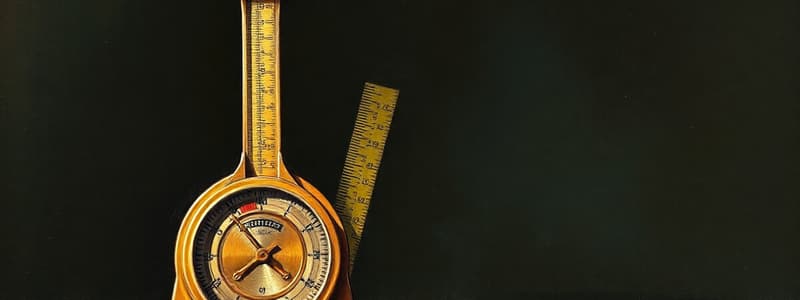Podcast
Questions and Answers
Which instrument is typically used to measure mass?
Which instrument is typically used to measure mass?
- Balance scale (correct)
- Caliper
- Protractor
- Thermometer
What modern device is primarily utilized for measuring time?
What modern device is primarily utilized for measuring time?
- Volume measuring cup
- Length gauge
- Stopwatch (correct)
- Density meter
Which of the following units would be least appropriate for measuring area?
Which of the following units would be least appropriate for measuring area?
- Liters (correct)
- Square meters
- Acres
- Hectares
To measure length in the metric system, which unit would you use?
To measure length in the metric system, which unit would you use?
Which combination correctly identifies both length and mass measuring devices?
Which combination correctly identifies both length and mass measuring devices?
Flashcards are hidden until you start studying
Study Notes
Measuring Length
- Local instruments: Rulers, measuring tapes, meter sticks are commonly used to measure length.
- Modern devices: Laser rangefinders, calipers, and ultrasonic sensors offer precise length measurements.
Measuring Area
- Local instruments: Rulers and measuring tapes can be used to calculate area by multiplying length and width.
- Modern devices: Digital planimeters and 3D scanners provide accurate area measurements.
Measuring Volume
- Local instruments: Graduated cylinders, beakers, and measuring cups are used to measure liquid volume.
- Modern devices: Pipettes, burettes, and volumetric flasks ensure precise volume measurements.
Measuring Mass
- Local instruments: Spring scales, balance scales, and weighing machines are commonly used to measure mass.
- Modern devices: Electronic balances, analytical balances, and load cells offer high precision and accuracy.
Measuring Time
- Local instruments: Clocks, watches, and stopwatches are used to measure time intervals.
- Modern devices: Atomic clocks, quartz crystal oscillators, and GPS receivers achieve exceptional timekeeping accuracy.
Units of Measurement
- Length: Centimeters (cm), meters (m), kilometers (km), inches (in), feet (ft), miles (mi).
- Mass: Grams (g), kilograms (kg), pounds (lb), ounces (oz).
- Time: Seconds (s), minutes (min), hours (hr), days (d).
Studying That Suits You
Use AI to generate personalized quizzes and flashcards to suit your learning preferences.




